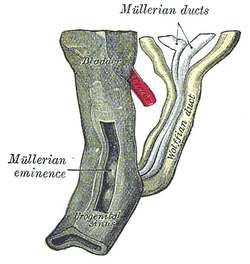Mesonephric ducts
| Mesonephric duct | |
|---|---|

Urogenital sinus of female human embryo of eight and a half to nine weeks old.
|
|

Transverse section of a chick embryo of forty-five hours' incubation.
|
|
| Details | |
| Carnegie stage | 11 |
| Days | 28 |
| Precursor | intermediate mesoderm |
| Gives rise to | vas deferens, seminal vesicles, epididymis |
| Identifiers | |
| Latin | ductus mesonephricus; ductus Wolffi |
| Code | TE E5.6.2.0.0.0.4 |
|
Anatomical terminology
[]
|
|
The mesonephric duct (also known as Wolffian duct, archinephric duct, Leydig's duct and nephric duct) is a paired organ found in mammals including humans during embryogenesis. Wolffian structures are male urogenital structures that include the epididymis, vas deferens, and seminal vesicles that differentiate from this structure.
The mesonephric duct connects the primitive kidney, the mesonephros, to the cloaca and serves as the anlage for certain male reproductive organs.
The mesonephric duct connects the primitive kidney, the mesonephros, to the cloaca and serves as the anlage for certain male reproductive organs.
In both the male and the female the mesonephric duct develops into the trigone of urinary bladder, a part of the bladder wall. However, further development differentiates between the sexes in the development of the urinary and reproductive organs.
In a male, it develops into a system of connected organs between the efferent ducts of the testis and the prostate, namely the epididymis, the vas deferens, and the seminal vesicle. The prostate forms from the urogenital sinus and the efferent ducts form from the mesonephric tubules.
...
Wikipedia
